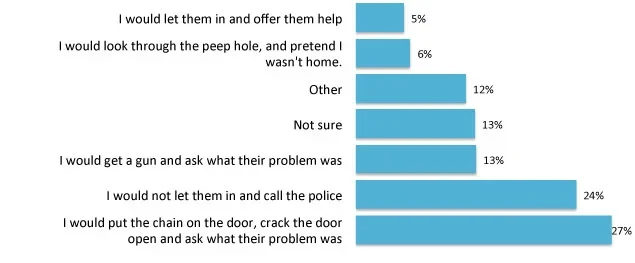Good Samaritans still exist – but Our Good Samaritan Omnibus Survey found that help was more likely to come from Americans on the street, beach or railway/subway station than if help was asked of somebody who was in the safety of their own home.
According to the survey, if somebody was lying injured on the street, 46% said their first reaction would be to rush to help straight away and 34% would call an ambulance and wait with the injured person until help arrived. More men (51%) than women (41%) would rush to help and more women (39%) than men (30%) would call the ambulance and wait. 4% would wait to see if somebody else would help first
A swimmer in distress would get immediate assistance from only 13% of responders who would jump in and try to help. 27%, however, would call a lifeguard and then try to help, 27% would call a lifeguard and wait for them to arrive. 20% would look for something to throw to the swimmer to try and keep them afloat.
A distressed pedestrian being abused by a group of teenagers verbally abusing passers-by might expect help from more than half of adults (51% would definitely or probably intervene) , but 11% definitely would not intervene.
There have been several high-profile cases of travelers in distress on the New York City subway system. One accident ended tragically when none of the bystanders offered aid but took photographs from their smartphones instead. Other have been rescued by quick thinking and brave Samaritans. 41% of Americans we surveyed thought that they would rush to aid if they saw somebody who fell on the railway/subway tracks. 31% thought that they would call for emergency services and try to give aid while they were waiting.
Attitudes change radically if the potential Samaritan is in their own home. If a victim in trouble tried to get help by knocking on doors, they might find the door closed on their face or worse. If somebody knocked asking for help 13% said their first reaction would be to get a gun and ask what their problem was. 24% would not open the door but call the police instead. 27% thought that they would put the chain on the door, crack the door open and ask what their problem was, and 6% would pretend they were not at home.
Now please imagine a stranger claiming to be in trouble knocked on your door and asked for help. Which ONE, if any, of the following BEST describes how you think you would react?

For further information about poll results, and for details about methodology and Omnibus services, please email omnibus.us@yougov.com.









